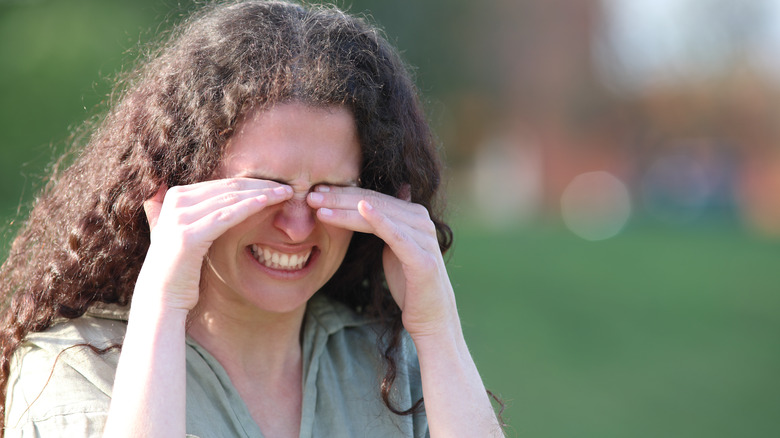Is Sun Gazing The Trick For Better Sleep? We Explain
According to Greek and Roman mythology, the ancient god Apollo was associated with the power of the sun, light, medicine, and healing, as outlined in a 2008 research article published in Environmental Health Perspectives. The meditative practice popularly known as sun gazing embodies these same fundamentals, purporting that staring directly into the sun can benefit our health and wellness (via Medical News Today). However, experts emphasize that not only is there no scientific evidence to support these claims, but that doing so can severely harm our vision.
Among the many effects sunlight has on the body, morning sun exposure has been linked with enhanced melatonin production for easier sleep at night. However, this is not in reference to staring right into the sun. Sun gazing is built upon the concept of focused attention meditation, in which a person visually focuses on an object while meditating in order to help keep their attention and prevent the mind from wandering (via Frontiers in Psychology). While it's probably safe to say that staring at a book or a crystal while meditating likely poses no harm to our eyes, the same cannot be said for the sun. In fact, you can do permanent retinal damage in less than 100 seconds of looking at the massive star, according to experts at NVISION Eye Centers.
Sun gazing may cause permanent eye damage
The damaging effects of sun gazing have been documented for decades, with a 1968 edition of the British Medical Journal (BMJ) noting cases of retina damage in association with watching the sky for aircrafts, looking towards the sun during religious practices, or sun gazing in connection with what the researchers referred to as "mental disturbance."
In a 1999 case report published in the Chinese Medical Journal, an intoxicated man who had spent three hours outside staring at the sun developed blurred vision, color distortion, and a central blind spot in the left eye, among other symptoms starting two days following sun exposure. Retinal damage was identified after six months, and decreases in visual acuity remained the same.
Mild symptoms associated with sun gazing include headache, teary eyes, and eye soreness, explains NVISION Eye Centers. In more severe instances, a person may experience multiple blind spots in their field of vision, reduced color vision, difficulty identifying shapes, or permanent eye damage.
Meditation may be the trick for better sleep, not sun gazing
Even if you were to wear protective sunglasses or time your sun gazing with the sunrise or sunset, this does not eliminate the risk of eye damage. The same is true if you were to stare at a solar eclipse. It's easy to assume that because the moon is obstructing the sun's rays during this rare phenomenon, there would be little risk in looking up at the sky. However, NVISION Eye Centers explains that even a quick glance can make one susceptible to retinal burns or eclipse blindness. The American Academy of Ophthalmology has highlighted case studies in which individuals staring at the sun during a solar eclipse suffered retinal cell damage in the shape of a crescent moon.
Due to the high risk for temporary or permanent eye damage, sun gazing is not a safe hack for enhancing sleep. Meditation itself, on the other hand, may be the trick you're looking for. Although more study is needed, research outlined in a 2020 systematic review published in Annals of the New York Academy of Sciences indicates that mindfulness meditation may have the potential to promote sleep quality in people with sleep disturbance.



